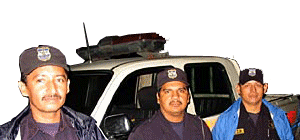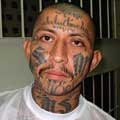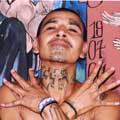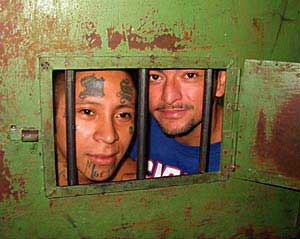Senior Reporter: Mandalit del Barco
Associates: Ruxandra Guidi, Sarah Bush
A decade after Central America's civil wars ended, authorities are now fighting a new enemy: street gangs. The U.S. routinely deports Latino gang members back to Central America. Authorities in El Salvador and Honduras have launched an all-out war, cracking down hard on the gangs. Many young people have been caught up in mass police sweeps, and vigilante groups have been targeting those associated with gangs. NPR reporter Mandalit del Barco looks at the links between la vida loca in California and in Central America.
Gang violence in Central America is fed by many factors,
including: family dislocation caused by war with the inevitable
consequence of internal displacement and a huge population of refugees
that left their countries never to return; a harsh economic environment
with persistent unemployment that has caused millions of people to leave
their countries, heading north in search of work and a paycheck to help
their families survive back home; and, as fuel for the fire, new U.S.
immigration policies that have brought about the deportation from the U.S.
of hundreds of thousands of "criminal aliens" who have overwhelmed the
legal systems of Central American and other impoverished countries. In
many cases, the deportees came to the U.S. with their families when they
were babies or young children and know nothing of the countries from
which they came. They are sent back to an experience of profound
alienation, isolation, and loneliness, often turning to gangs for
protection or even a sense of family. (From a report by the Interfaith
Task Force on Central America.)
For more information about the issues raised in the segment Los Homies: Youth and the Gang Phenomenon, see the following books and articles.
(Note: this is not intended as a complete list. Check back for more recommendations and an opportunity to make your own recommendations soon.)
![]()
Hayden, Tom, Street Wars: Gangs and the Future of Violence
Rodriguez, Luis, Always Running
Sanchez, Reymundo, My Bloody Life: The Making of a Latin King
Murray, Yxta Maya, Locas
Vigil, James Diego, Barrio Gangs: Street Life and Identity in Southern California
Fremon, Celeste, Father Greg and the Homeboys: The Extraordinary Journey of Father Boyle and His Work with the Latino Gangs of East L.A.
![]()
Homies Unidos web page with links to articles
"Gang Wars and the War on Gangs" by Diego Cavallo, Child and Youth Care International
Child and Youth Care International
Mennonite Central Committee: Gangs in Central America
"Central American's Latest War - Gang Violence" by Yazmin Ross, World Press Review, May, 1993
"Central America Takes Harder Line Against Gangs" , Christian Science Monitor
"The Fatal Compulsion to Belong" by W. E. Gutman, The Panama News, May 9-22, 2004
"Grim News in Central America: Wave of Gang Violence Grows" by Kari Lydersen, Americas.org, January 29, 2004
"A History of California's Hispanic Gangs" by Al Valdez, National Alliance of Gang Investigators Associations
"Combating El Salvadorĺ─˘s Gangs" by Claire Marshall, BBC News
"Crackdown on Gangs Brings Mexico Violence" by Mark Stevenson, AberdeenNews.com
"Declaring War on Gangs" by Edgardo Ayala, Inside Costa Rica, Oct. 14, 2003
Produced by GraciasVida Media Center, the independent journalism resource for Latin America.
For more information, contact:
Producer Maria Martin
email: graciasvida.media@gmail.com
or telephone: 415.670.9717
Funded by
![]()
and the Fund for Investigative Journalism.
© Maria Martin
Photo at top left © Donna DeCesare www.donnadecesare.com



 David Eurgenia, a Mara Salvatrucha member, in an El Salvador prison.
"Just because we have tattoos, we get arrested... Whether we committed a crime or not, we're imprisoned."
David Eurgenia, a Mara Salvatrucha member, in an El Salvador prison.
"Just because we have tattoos, we get arrested... Whether we committed a crime or not, we're imprisoned."
 Gang member Carlos Tivari "El Unico" is an inmate at El Salvador's Quezaltepeque prison.
"La Mara Salvatrucha, la M.S., es mi barrio, man, por vida," he says.
Gang member Carlos Tivari "El Unico" is an inmate at El Salvador's Quezaltepeque prison.
"La Mara Salvatrucha, la M.S., es mi barrio, man, por vida," he says.
 Mara Salvatrucha member at the Quezaltepeque prison.
Mara Salvatrucha member at the Quezaltepeque prison.
